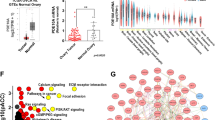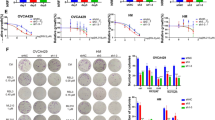Abstract
Many reports have demonstrated that non-steroidal anti-inflammatory drugs (NSAIDs) suppress malignant transformation and tumor growth, and some NSAIDs are expected to be new anti-cancer agents. In this study, we examined the anti-tumor effects of the non-specific cyclooxygenase (COX) inhibitors aspirin and piroxicam, and the selective COX-2 inhibitor meloxicam on xenotransplanted ovarian cancer. Tumor growth and survival were compared in female nu/nu mice, xenografted with subcutaneous OVCAR-3 tumors or with intraperitoneal DISS tumors and treated with aspirin (200 ppm in diet, everyday), piroxicam (150 ppm in diet, everyday) or meloxicam (162 ppm in diet, everyday). Al, of the agents tested significantly suppressed the growth of OVCAR-3 tumors xenotransplanted subcutaneously as compared to the control. There was a significant difference in inhibition of OVCAR-3 tumor growth between meloxicam and aspirin treatment. Meloxicam and piroxicam treatment significantly prolonged survival of mice with malignant ascites derived from DISS cells as compared to control and aspirin treatment. Mice treated with meloxicam survived significantly longer than those treated with piroxicam. There was no significant difference in survival between control and aspirin treatment. Necropsy revealed that one of the 6 cancer-bearing mice treated with piroxicam suffered from stomach perforation. These results indicate that a selective COX-2 inhibitor produces greater anti-tumor effect against ovarian cancer than a nonselective COX inhibitor and that meloxicam may have a potential of leading to a novel therapeutic strategy against ovarian cancer.
Similar content being viewed by others
References
Aas AT, Tonnessen TI, Brun A, Salford LG: Growth inhibition of rat glioma cells in vitro and in vivo by aspirin. J Neurooncol 24: 171–180, 1995.
Akhmedkhanov A, Toniolo P, Zeleniuch-Jacquotte A, et al: Aspirin and epithelial ovarian cancer. Prev Med 33: 682–687, 2001.
Baron JA, Sandlers RS: Non-steroidal anti-inflammatory drugs and cancer prevention. Annu Rev Med 51: 511–523, 2000.
Blanco FJ, Guitian R, Moreno J, et al: Effect of anti-inflammatory drugs on COX-1 and COX-2 activity in human articular chondrocytes. J Rheumatol 26: 1366–1373, 1999.
Cramer DW, Harlow BL, Titus-Ernstoff L, et al: Over-the-counter analgesics and risk of ovarian cancer. Lancet 351: 104–107, 1998.
Craven PA, DeRubertis FR: Effect of aspirin on 1,2-dimethyl-hydrazine-induced colonic carcinogenesis. Carcinogenesis 13: 541–546, 1992.
Denkert C, Kobel M, Pest S, et al: Expression of cyclooxygenase 2 is an independent prognostic factor in human ovarian carcinoma. Am J Pathol 160: 893–903, 2002.
di Palma A, Matarese G, Leone V, et al: Aspirin reduces the outcome of anticancer therapy in Meth A-bearing mice through activation of AKT-glycogen synthase kinase signaling. Mol Cancer Ther 5: 1318–1324, 2006.
Din FV, Dunlop MG, Stark LA: Evidence for colorectal cancer cell specificity of aspirin effects on NFB signalling and apoptosis. Br J Cancer 91: 381–388, 2004.
Drake JG, Becker JL: Aspirin-induced inhibition of ovarian tumor cell growth. J Obstet Gynecol 100: 677–682, 2002.
Duperron C, Castonguay A: Chemoprevention efficacies of aspirin and sulindac against lung tumorigenesis in A/J mice. Carcinogenesis 18: 1001–1006, 1997.
Ferrandina G, Lauriola L, Zannoni GF, et al: Increased cyclooxygenase-2 (COX-2) expression is associated with chemotherapy resistance and outcome in ovarian cancer patients. Ann Oncol 13: 1205–1211, 2002.
Greenlee RT, Murray T, Bolden S, Wingo PA: Cancer statistics. Ca Cancer J Clin 50: 7–33, 2000.
Goldman AP, Williams CS, Sheng H, et al: Meloxicam inhibits the growth of colorectal cancer cells. Carcinogenesis 19: 2195–2199, 1998.
Henry D, Lim LLY, Rodriguez LS, et al: Variability in risk of gastrointestinal complications with individual non-steroidal anti-inflammatory drugs: results of a collaborative meta-analysis. Br Med J 312: 1563–1566, 1996.
Kern MA, Schoneweis MM, Sahli D, et al: Cyclooxygenase-2-inhibitors suppress the growth of human hepatocellular carcinoma implant in nude mice. Carcinogenesis 25: 1193–1199, 2004.
Laudanno OM, Cesolari JA: In vivo selectivity of nonsteroidal anti-inflammatory drugs and gastrointestinal ulcer in rats. Dig Dis Sci 45: 1359–1365, 2000.
Li H, Kramer P, Steele V, et al: Effect of duration of treatment with piroxicam on azoxymethane-induced colon cancer, aberrant crypt foci, apoptosis and cell proliferation in rats. Cancer Lett 147: 187–19323, 1998.
Liu CH, Chang SH, Narko K, et al: Overexpression of cyclooxygenase-2 is sufficient to induce tumorigenesis in transgenic mice. J Biol Chem 276: 18563–18569, 2000.
Mohammed SI, Bennett PF, Craig BA, et at: Effects of the cyclooxygenase inhibitor, piroxicam, on tumor response, apoptosis, and angiogenesis in a canine model of human invasive urinary bladder cancer. Cancer Res 62: 356–358, 2002.
Moysich KB, Mettlin C, Piver MS, et al: Regular use of analgesic drugs and ovarian cancer risk. Cancer Epidem Biomarkers Prev 10: 903–906, 2001.
Piazza GA, Alberts DS, Hixson LJ, et al: Sulindac sulfone inhibits azoxymethane-induced colon carcinogenesis inn rats without reduced prostaglandin levels. Cancer Res 57: 2909–2915, 1997.
Pollard M, Luckert PH: Prevention and treatment of primary intestinal tumors in rats by piroxicam. Cancer Res 49: 6471–6473, 1989.
Prescott SM, White RL: Intimate connection between APC and prostaglandin H synthase-2. Cell 87: 783–786, 1996.
Reddy BS, Rao CV, Rivenson A, Kelloff G: Inhibitory effect of aspirin on azoxymethane-induced colon carcinogenesis in F344 rats. Carcinogenesis 14: 1493–1497, 1993.
Ricchi P, Pignata S, Di Popolo A, et al: Effect of aspirin treatment on cell proliferation and differentiation of colon adenocarcinoma Caco-2 cells. Int J Cancer 73: 880–884, 1997.
Rozic JG, Chakraborty C, Lala PK: Cyclooxygenase inhibitors retard murine mammary tumor progression by reducing tumor cell migration, invasiveness and angiogenesis. Int J Cancer 93: 497–506, 2001.
Sakamoto A, Yokoyama Y, Umemoto M, et al: Clinical implication of expression of cyclooxygenase-2 and peroxisome proliferator activated-receptor g in epithelial ovarian tumours. Br J Cancer 91: 633–638, 2004.
Sheng H, Shao J, Kirkland SC, et al: Inhibition of human colon cancer cell growth by selective inhibition of cyclooxygenase-2. J Clin Invest 99: 2254–2259, 1997.
Shibata MA, Hirose M, Masuda A, et al: Modification of BHA forestomach carcinogenesis in rats: inhibition by diethylmaleate or indomethacin and enhancement by a retinoid. Carcinogenesis 14: 1265–1269, 1993.
Shigemasa K, Tian X, Gu L, et al: Expression of cyclooxygenase-2 and its relationship to p53 accumulation in ovarian adenocarcinomas. Int J Oncol 22: 99–105, 2003.
Smalley W, DuBois RN: Colorectal cancer and non steroidal anti-inflammatory drugs. Adv Pharmacol 39: 1–20, 1997.
Smith WL, Garavito RM, DeWitt DL: Prostaglandin endoperoxide H synthases (cyclooxygenase)-1 and -2. J Biol Chem 271: 33157–33160, 1996.
Taketo MM: Cyclooxygenase-2 inhibitors in tumorigenesis (Part I). J Natl Cancer Inst 90: 1529–1536, 1998.
Tsubouchi Y, Sano H, Kawahito Y, et al: Meloxicam inhibits the growth of non-small cell lung cancer. Anticancer Res 20: 2867–2872, 2000.
Tsujii M, Kawano S, Tsuji S, et al: Cyclooxygenase regulates angiogenesis induced by colon cancer cells. Cell 93: 705–716, 1998.
van Rees BP, Saukkonen K, Ristimaki A, et al: Cyclooxygenase-2 expression during carcinogenesis in the human stomach. J Pathol 196: 171–179, 2002.
Yao M, Kargman S, Lam EC, et al: Inhibition of cyclooxygenase-2 by rofecoxib attenuates the growth and metastatic potential of colorectal carcinoma in mice. Cancer Res 63: 586–592, 2003.
Yokoyama Y, Sakamoto T, Sato S, Saito Y: Evaluation of cytoreductive surgery with pelvic and paraaortic lymphadenectomy and intermittent cisplatin-based combination chemotherapy for improvement of long-term survival in ovarian cancer. Eur J Gynaecol Oncol 20: 361–366, 1999.
Author information
Authors and Affiliations
Corresponding author
Additional information
This study was supported in part by a Grant-in Aid for Cancer Research (No. 16591632) from the Ministry of Education, Science and Culture of Japan and by the Karoji Memorial Fund of the Hirosaki University School of Medicine.
Rights and permissions
About this article
Cite this article
Xin, B., Yokoyama, Y., Shigeto, T. et al. Anti-tumor effect of non-steroidal anti-inflammatory drugs on human ovarian cancers. Pathol. Oncol. Res. 13, 365–369 (2007). https://doi.org/10.1007/BF02940318
Received:
Accepted:
Issue Date:
DOI: https://doi.org/10.1007/BF02940318




